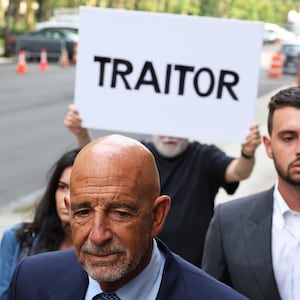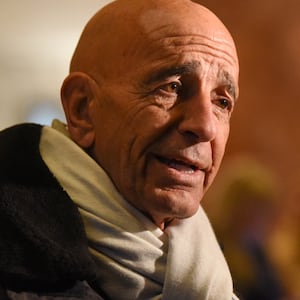The Justice Department has updated its indictment of former President Donald Trump’s billionaire buddy Thomas Barrack, documenting how he quietly tweaked the GOP platform at the 2016 Republican National Convention to avoid mentioning the Saudi royal family’s connection to the 9/11 hijackers.
On Monday, the DOJ replaced its original 46-page charging document with an expanded 55-page superseding indictment that more closely details how the financier allegedly exploited his proximity to Trump to make secret deals with the United Arab Emirates.
Barrack, who was also the chairman of Trump’s 2017 inauguration committee who got caught misspending funds while ushering in a new era of political corruption, was arrested last year on charges of foreign lobbying and obstruction of justice.
In the latest version of the indictment, federal prosecutors documented the role Barrack played at the run-up to the 2016 Republican National Convention in Cleveland, Ohio. As a congressional investigation has since uncovered, Barrack had already allowed the Saudis and Emiratis to edit a major Trump campaign speech about energy, in which he made a pledge to "work with our Gulf allies.” Then, as Barrack’s relationship to the Emiratis got tighter, the meddling increased.
Seven weeks before the Republican convention, according to the revised indictment, someone only referred to as “Person-1” emailed Barrack about developing the GOP talking points at the convention. (The news site Middle East Eye, which initially broke news about the existence of these emails has surmised that this person was criminal political strategist Paul Manafort.)
“We need to talk about language for me to put in [the national political party] platform at national convention. Can be much more expansive than what we did in speech,” this person wrote to Barrack, adding a notable caveat that the “platform language” would be “based on what you hear from your friends.”
But just a week before the start of the GOP convention, the draft platform was deemed too problematic by “Person-1.”
Trump had previously promised to release the infamous 28 pages missing from a House and Senate joint intelligence report documenting the plane hijackers’ connections to the Saudi government and royal family—classified details that victims, activists, and journalists had long sought to make public. But on July 13 that year, this person wrote to Barrack that Republicans would have to back down from mentioning that.
This person wrote to Barrack that any mention “that was anti the Saudi Royal Family was removed from the platform.”
According to federal investigators, who have acquired suspects’ communications, Barrack then turned around and forwarded that email to UAE businessman Rashid Al-Malik. (The DOJ has also indicted Al-Malik, who is accused of passing along information to UAE government spies.)
In his note to his UAE contact, Barrack allegedly wrote that the email was “very confidential but you can share with HH. Please do not circulate any further since it is very sensitive.”
According to the feds, Al-Malik then forwarded that email to an unnamed Emirati official. But Barrack is also accused of passing that information along to a yet another unnamed Emirati official whom other journalists have identified at UAE ambassador Yousef Al Otaiba. Barrack allegedly told him the information was “really confidential but important.”
Otaiba still retains that post in Washington, D.C. The Emirati embassy did not respond to requests for comment on Tuesday.
The long-awaited missing 28 pages were eventually released—albeit with redactions—by President Barack Obama that very summer. The New York Times called it a “frustrating time capsule” whose importance grew over the years, but which ultimately showed that the tenuous connections between the 9/11 terrorists and Saudi leadership did not prove to be the vast conspiracy many suspected.
Brian McGlinchey, an independent journalist in San Antonio, Texas, who played a pivotal role in aggressively pushing for their release, told The Daily Beast that he welcomes the DOJ’s new focus on Barrack’s alleged role in having the GOP avoid the subject.
“It underscores the hypocrisy of the Trump camp, because at that time, there was an active presidential campaign going on,” he said. “You’ve got the candidate out front raising deep suspicions about Saudi involvement, at the same time you have these back channel maneuvers at the Republican convention to help the Saudis avoid embarrassment.”
When reached for comment, the Republican National Committee told The Daily Beast it was unaware of what transpired.
“The DOJ has not reached out to the RNC on this subject, nor do we have knowledge of this issue. Additionally, current RNC leadership was not involved with the 2016 platform,” said Emma Vaughn, the group’s spokeswoman.
The DOJ on Monday also hit Barrack with two additional criminal charges of making “material false statements” for allegedly lying to the FBI during a June 20, 2019 interview. Although some of the allegations were lumped together in the original set of charges, the revised indictment is now charging him separately for allegedly lying about only having one phone when he actually had a dedicated line for secretly communicating with the Emiratis.
Barrack’s legal team declined to comment for this story, citing the ongoing case, which is currently set for trial in the late summer.









